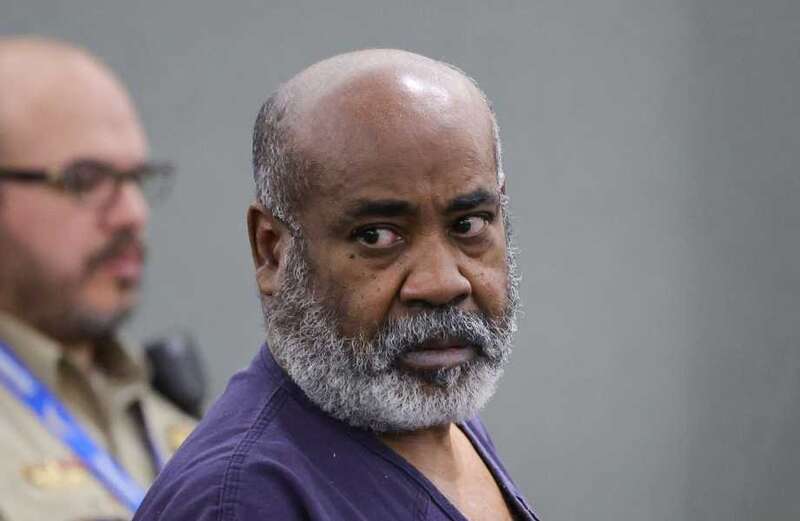KEEFE D "is stuck in a Catch 22” over his infamous confession to cops about killing Tupac that he made under what he thought was an immunity deal - but it could now be used in court to convict him.
Keefe - real name Duane Davis - has denied to a Las Vegas court judge having any involvement in the murder of rapper Tupac, even though he confessed in a police interview in 2008.



On the bombshell tape, Keefe admits to chasing Tupac, who was being driven by Death Row Records boss Suge Knight in Vegas in September 1996.
He claimed that his nephew Orlando "Baby Lane" Anderson "popped the dude."
In detail he explained to officers that Anderson "leaned over, rolled down the window, and popped them," adding, "I seen a bullet go in Suge's head. I thought he was dead."
 What Ola and James Jordan really ate and did to shed 7st
What Ola and James Jordan really ate and did to shed 7st
That admission, recorded by members of an LAPD Federal task force, has never been allowed to be used against the ex Crip in any court case over a legal technicality.
The force gave him an immunity deal - called a "Proffer" - for breaking the gangster’s silence code by explaining how, as leader of armed gangbangers, they hunted down the California Love star.
That taped interview, overseen by officer Greg Kading, effectively solved the Tupac murder case, but was never admissible in court.
However, Keefe now faces that tape being presented as key evidence by the Clark County DA thanks to a legal loophole, which states that any person who admits to lying in a "Proffer" automatically loses protection.
Keefe’s entire defense, as described by his special defenders, centers on him insisting that he lied about the Tupac murder for “fame and fortune.”
The U.S. Sun obtained legal papers opposing Keefe's bail request motion, which was filed last week.
In the court documents, Chief Deputy District Attorney Marc DiGiacomo wrote: “If defendant’s position is that his statements are all lies, then his proffer would certainly be admissible at trial.”
A legal source, who has met Keefe, said: “He's caught in a real problematic place.
"His defense of stating that he fabricated his involvement in Tupac’s murder is a ‘Hail Mary’ - but actually puts him in a perilous situation regarding the proffer deal.
“His admission to lying means that the DA can use the 2-hour recording, where he effectively serves up a play-by-play of how it went down.
 I'm a 'time traveler' - the 'worst case scenario that could kill us all'
I'm a 'time traveler' - the 'worst case scenario that could kill us all'
'POWERFUL EVIDENCE'
“It would be seen as powerful piece of evidence for a jury to hear.”
The source added that he is in a "Catch 22…because sticking with the story means the proffer is probably top of the prosecutors' evidence list at trial.”
The source claimed that “Keefe is totally ignorant about the nature of his proffer deal.
"He just thinks that talking to the task force about Tupac, Biggie, and a host of other criminal acts gave him lifetime immunity. It never did.
"It was simply that those admissions could not be used by police to prosecute him; it didn’t mean other evidence couldn’t convict him.
“And the kicker was that if he now claims he lied in that proffer, about his connection to Tupac, then his taped confession comes back to the table.”
The legal source says he believes that Keefe “still doesn’t quite get what is happening and continues to tell people that he has lifetime immunity.”
WHO'S TO BLAME
“Keefe wrongly believed that, when he spoke to Kading, that he would never have to answer to his crimes," he said.
“Keefe blames officer Kading for getting him into trouble from the beginning.
“His argument of saying he spoke on Tupac for fame and fortune doesn’t stand up with the proffer tape. The police were not probing that murder and he opened up voluntarily about Tupac.”
The confession tape was first heard in public in the documentary Murder Rap: Inside the Biggie and Tupac Murders, which premiered in 2015.
During lengthy segments in the recordings, Keefe makes it clear that he orchestrated the murder of Tupac on September 6, 1996.
He spoke on how he procured a weapon for the kill and drove with gangster Orlando in a white Cadillac hunting for the star.
Boasting that his interview was, “Gonna blow your mother f***ing mind” he claimed that his nephew Orlando Anderson fired the Glock which killed Tupac.
In the tape, he also says that had the car pulled up alongside Tupac on the right side of the vehicle, then he would have fired on him.
“If he [Tupac] would have been on my side, I would have blast.”
Keefe D
“If he would have been on my side, I would have blast,” he sensationally tells cops, thinking he was immune from any prosecution.
Despite the critically acclaimed show Murder Rap revealing the explosive tape recording, Las Vegas Metro Police could not act on Keefe's confessions due to the legal parameters.
However, once Keefe began giving interviews to media regarding the assassination and Tupac, cops reactivated their open murder investigation.
The U.S. Sun was first to reveal that homicide detectives were meeting and interviewing associates of Keefe regarding the murder.
He was charged in September 2023 and is currently awaiting trial.
Keefe faces court next week to hear the results of his bail application.
The U.S. Sun has reached out to lawyers for Keefe for comment.





































